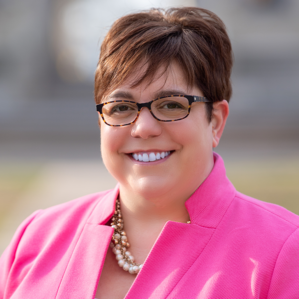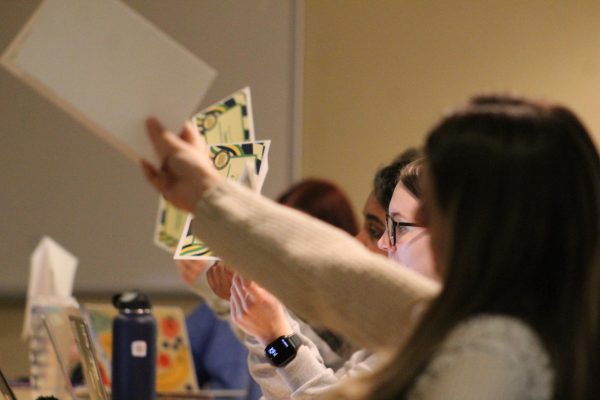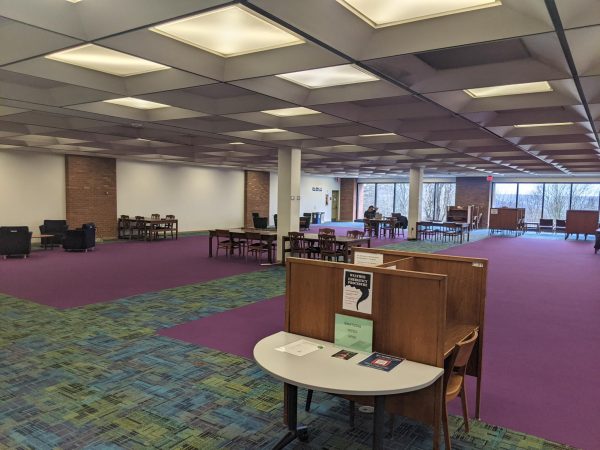Campus activists plan for future
Approximately 20 students gathered in Quigley Hall Auditorium on Tuesday, Dec. 6, to voice ideas for prospective action that could be taken against what they believe is hate-inspired rhetoric of Donald Trump.
The event was meant to continue student protests against the hate which many feel the election has inspired. The call to action began with a march and protest in Brooks Circle on Nov. 14, 2016, according to one of the event’s organizers, Yemi Olaiya, ’17.
Olaiya said the event was meant to be a way to gather ideas on how to best mobilize students to protest the campaign rhetoric and appointments of Donald Trump.
I think at this point grassroots efforts are more important than ever.
— Benjamin Grzesiak
“For me, it’s where we start thinking about what’s going to happen after Trump takes office,” Olaiya said. “This is just seeing where we want to move.”
The event began with Olaiya asking for the assembled students to voice any of their concerns regarding the election of Trump. The question was met with silence, and Olaiya began listing some of the policies for which Trump has proclaimed his support.
Olaiya also asked what the assembled students, staff and faculty would think of reaching out into the Meadville community and attempting to hold sustained dialogues with community members. The idea was met with support from the assembled students. Shannan Mattiace, chair of the political science department, however, said it may be too early to know what course of action to take.
“It’s so hard to know what President-elect Trump will do,” Mattiace said.
Mattiace said Trump has already recanted on many of his campaign promises, so it is difficult to know exactly what to expect come January when he takes office.
“We have to be very judicious with our energy and how we use it,” Mattiace said.
Brianna Cusanno, ’17, said that even though many of Trump’s promises have not been kept, he has already begun to display the type of president he will be with his cabinet appointments.
“I think he sent a lot of clear signals with his appointments,” Cusanno said.
Olaiya said that despite the “flip-flopping” Trump has done on his policies since his election, as a community, the campus can still have a conversation.
While Olaiya is a fellow with the Andrew Goodman Foundation, an organization which seeks to promote voter turnout and democratic participation, she said she has been helping to organize events like the protest in Brooks Circle and the town hall discussion separate from her fellowship, as a private citizen. She said she feels the main goal should be to facilitate contact with and organize students.
“It can be anyone from [the Association for the Advancement of Black Culture] to the Chess Club,” Olaiya said.
Several students who participated in the discussion in Quigley voiced their feelings about the effect small grassroots efforts can have.
“I think at this point, grassroots efforts are more important than ever,” said Benjamin Grzesiak, ’19, a student who attended the event.
Grzesiak pointed to the success of protesters in North Dakota who stopped the construction of the Dakota Access Pipeline. He said as citizens it is important not to forget the power the people have over their government.
“We will always be many, and they will always few,” Grzesiak said.
Cody Baumeister, ’20, another student who attended the event, said it is important for students to recognize the power they have, especially when it comes to their local congressional representatives. He said if a large number of people contact their representative at the same time, it will force them to take notice.
“That’s going to have a far bigger impact,” Baumeister said.
Olaiya said she and other organizers had initially wanted to hold another event to draw attention to the Electoral College vote on Dec. 19. She said the event is scheduled to coincide with Allegheny’s study day on Wednesday, Dec. 14, before finals begin. Many students, however, have already said they would be unable to attend the event due to scheduling conflicts.
Despite the uncertainty, Olaiya said she and her fellow organizers plan to continue to mobilize and call for action against Trump’s rhetoric and any policies they deem to be discriminatory.








